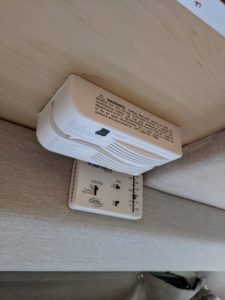
RV safety detectors are common standard equipment no matter what type of motorhome, travel trailer or 5th wheel you have. They exist to alert you to dangerous and often life-threatening situations. These include fire, carbon monoxide poisoning, and an explosive build-up of propane gas. But how safe are your RV safety detectors?
Smoke, carbon monoxide, and LP (propane) detectors all have a useable service life, which for most monitors now spans 5 to 10 years. They would all probably work longer than 5 years, but when you consider how relatively inexpensive they are and their role in protecting your life and property, why risk it?
How old are your RV safety detectors?
Our Roadtrek is now 10 years old, so when I found out about RV safety detectors having a lifespan, I went looking to update them. The new CO and LP detectors I purchased have an end of life alert built into them. After 5 years, they will start beeping. Apparently, you can reset the warning for a few days before it bugs you again. But after 30 days of resetting the alert, it will refuse to be dismissed.

For the most part, replacing the detectors should be straightforward. With minimal knowledge of electrical work, you can swap out the old unit for the new one as long as you find an exact replacement. One critical electrical safety tip is to unplug from shore power and make sure your battery disconnect switch is on (batteries disconnected). The key is to make sure no electricity is flowing through the wires when you are working with them.

Each rig has its own set of RV safety detectors, but the basic premise for replacing them is the same. You need to remove the device from the wall or ceiling onto which it is mounted to access the connecting wires. Do this carefully so you don’t end up pulling the wires loose from their connections to the rig.
Carefully remove the wires where they connect from the RV safety detector to the rig’s electrical system. Depending on how the manufacturer joined things initially, you may need to cut the wires apart. If you do, make sure you leave as much of the wire sticking out of the rig as possible.
Keep track of which color wires go to which, as RVs use a different coloring system than houses. I have even found different coloring schemes within the same rig. One trick is to take a picture of the wires before you disconnect them. That way, you can double-check the installation of the new unit before turning the power back on.
Out with the old, in with the new…and different

Occasionally, you will find that a direct replacement part isn’t available. That’s when you may need to make some modifications to the mounting area, as I did recently with our LP detector. I couldn’t locate the original flush-mount model to order a direct replacement. So, I bought a different flush-mount model from the same company that makes our CO detector. That meant having to turn a circle into a rectangle to mount the new unit properly. It wasn’t a bad experience, even for a guy like me who usually is just handy enough with carpentry tools to be dangerous!

If you do replace a monitor with a different model, be sure you purchase the RV style model. Companies design them to handle the shake, rattle, and roll that comes with RV travel.
 It took part of an afternoon to replace all three of our RV safety detectors. The only reason it took that long was due to the cuts I had to make in the wooden box our LP detector attaches to. That meant additional cleanup, as well. Otherwise, replacing your RV safety detectors should be a quick and simple job.
It took part of an afternoon to replace all three of our RV safety detectors. The only reason it took that long was due to the cuts I had to make in the wooden box our LP detector attaches to. That meant additional cleanup, as well. Otherwise, replacing your RV safety detectors should be a quick and simple job.
So how safe are your RV safety detectors? If you don’t know how old they are or haven’t tested them lately, do not delay. It could quite literally save your life.
